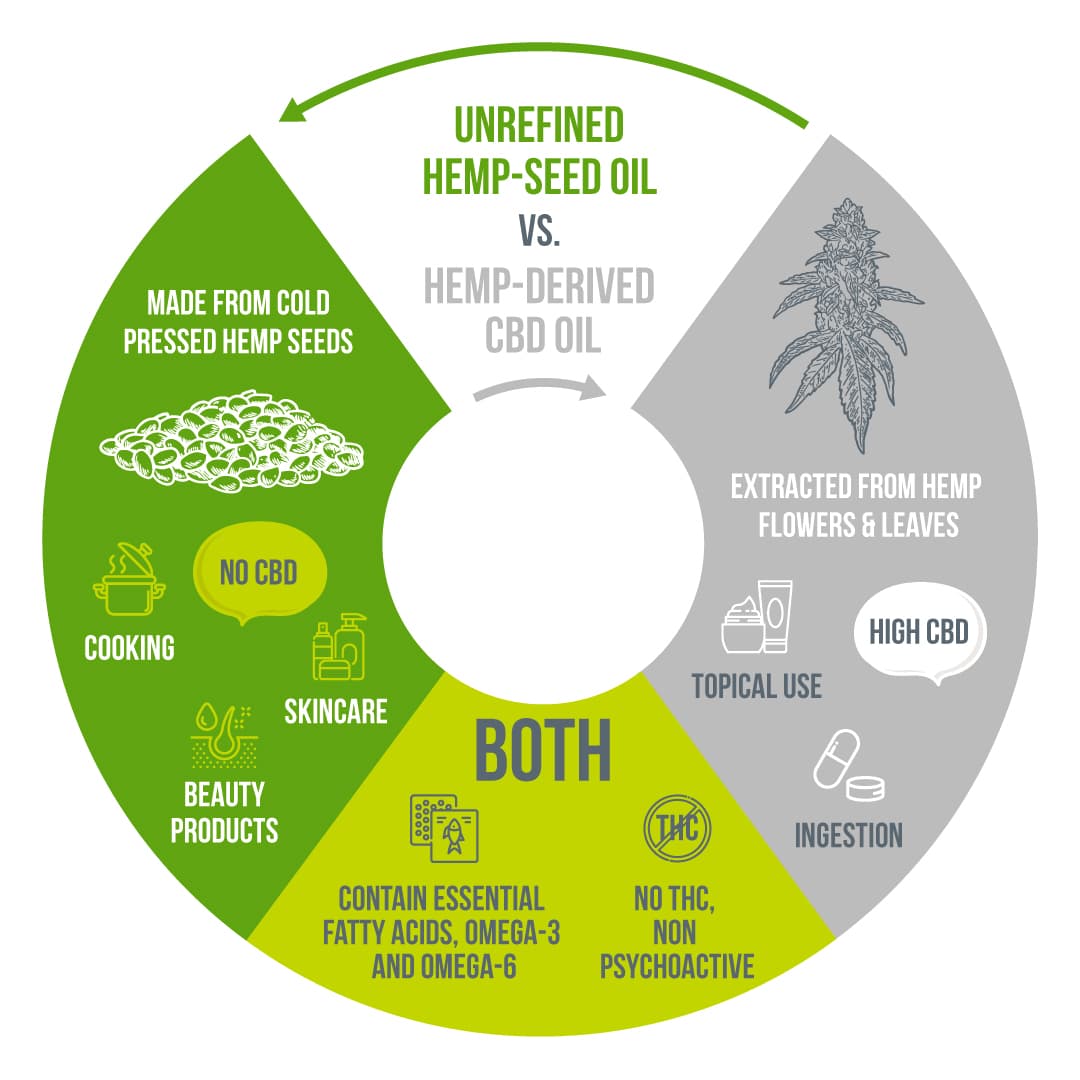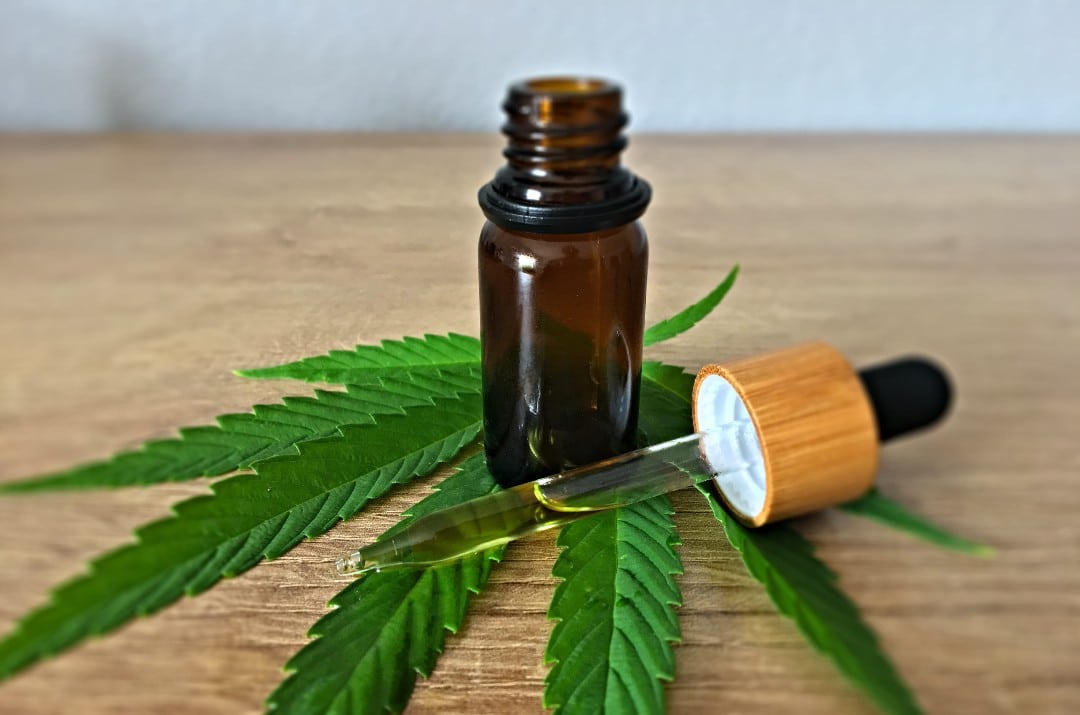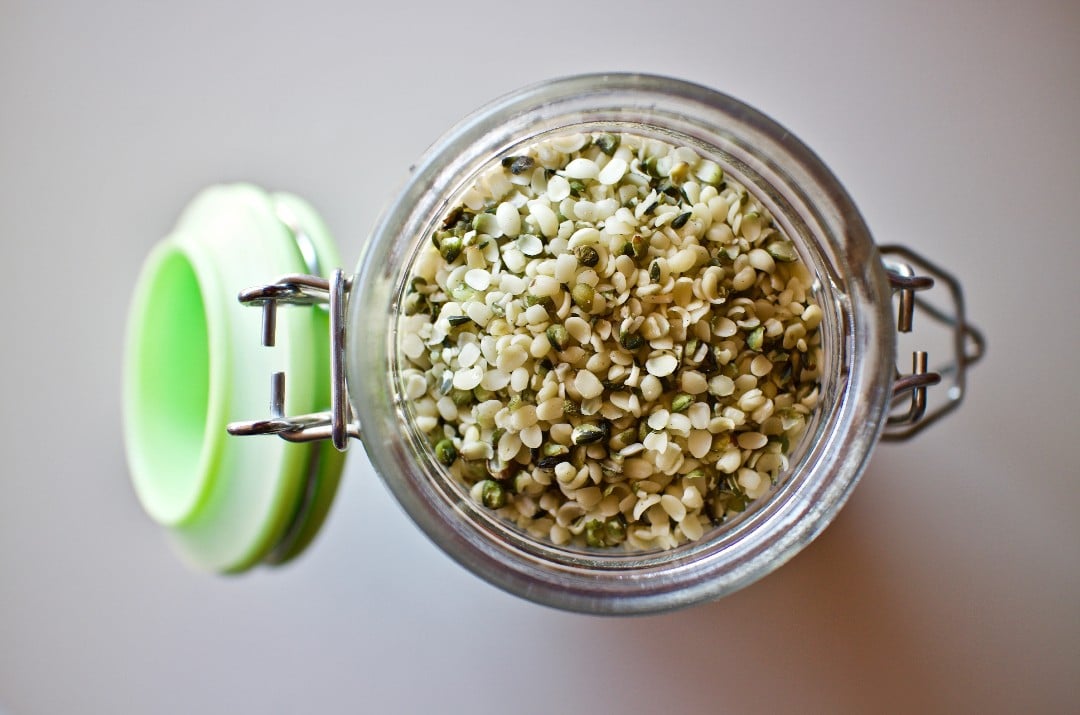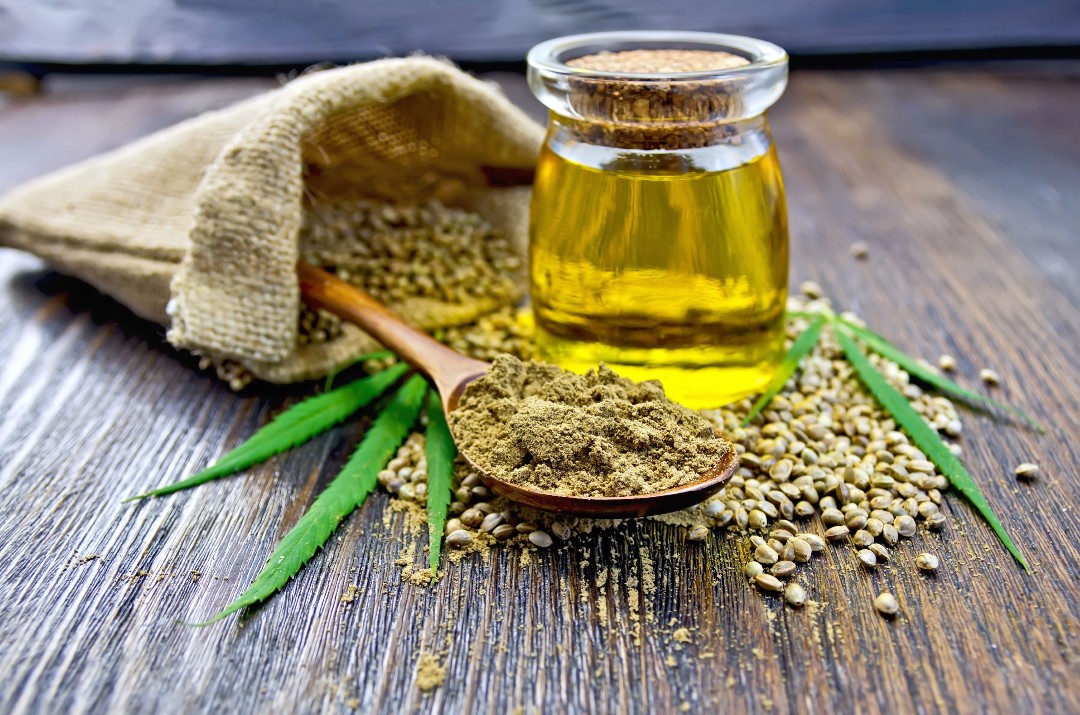Distinguishing between CBD oil and hemp seed oil can be confusing, in part, due to their similar names, and in part, due to the lack of understanding of how they are produced. While they sound alike, these two types of oils have different chemical makes ups and serve different purposes.
The two names are sometimes used interchangeably, with manufacturers confusing consumers further by using variations such as, “hemp oil,” or “hemp extract.”
Hempseed oil and CBD oil are both derived from the hemp plant; however, that’s where many of their similarities end.
As a healthcare practitioner seeking naturally-derived pain-relief products for your clinic, it’s important to understand these differences so you can distinguish the best products for your patients.
Let’s take a deeper look at the differences below.
CBD Oil Vs. Hemp Seed Oil: What’s the Difference?
With all of the new and emerging cannabis products on the market, it can be daunting for patients and clinicians to find the right product(s) they are looking for, and to distinguish between them. For this reason, we’ve created this infographic for your convenience. Feel free to print it out and share it with your patients or clients!
The key difference is that hemp seed oil does not contain any cannabinoids, including CBD. Please read on in more detail about the differences below.

*Note: Broad spectrum and CBD isolate do not contain traceable quantities of THC. Full spectrum, on the other hand, can legally only contain up to 0.3% THC, a negligible trace amount. CBD CLINIC’s primary products are formulated with broad spectrum CBD and the massage series is formulated with full spectrum CBD87hj22222 These topical products do not enter the bloodstream.
What is CBD Oil?

CBD is just one of many cannabinoids, naturally occurring compounds, present in cannabis plants. Legal CBD oil will always be derived from hemp, just like all other CBD products on the market.
CBD is present only in the aerial parts of the plant, with the greatest concentration of CBD in the plant’s flowers. Although the highest concentration of CBD is present within those flowers, CBD oil is most often produced from all aerial parts (i.e., the leaves, stems, and flowers).
When purchasing CBD products, you may notice that CBD oil comes in three spectrums.
- Full-spectrum implies that the end-product is composed of all of the compounds within the aerial parts, including other cannabinoids like THC, in addition to flavonoids and terpenes. Full-spectrum products are the least manipulated, and therefore contain 0.3% or less THC, a negligent amount allowed by law.
- Broad-spectrum means that the end-product undergoes an extra step in the refinement process. It contains the same additional compounds as full-spectrum CBD, however it does not include any THC.
- Isolate means that the end composition includes only CBD and no other cannabis compounds.

What is the Entourage Effect? Compounds that stay together work together
The entourage effect is the idea that cannabis plant compounds, including cannabinoids, terpenes and flavonoids; work best when combined in products because they maximize each other’s effects on the endocannabinoid system. Because why isolate just CBD when it can work in synergy with other cannabis plant when they are combined to maximize the potential of the plant? For this reason, many people prefer to use full-spectrum or broad-spectrum CBD oil. However, those who work in federal jobs take CBD isolate or broad spectrum CBD just to be on the safe side if they are worried about the minute chance of failing a THC drug test.
What is the bioavailability of CBD and how does it affect drug testing?
As you may have learned in your pharmacology courses, the bioavailability of a product refers to how much your body absorbs a substance for systemic circulation. The bioavailability of CBD varies based on both the concentration of CBD in a product as well as the method of consumption. For example, CBD ingestibles have a lower bioavailability than CBD oil or tinctures taken sublingually. To reach the bloodstream, CBD in ingestibles must pass through the digestive tract first. They are exposed to the first pass effect (I.e., the concentration of the substance, particularly when administered orally, is broken down before it can circulate the system). The process forces some of the CBD to filter out, resulting in a bioavailability of 4%-20%.
However, CBD taken sublingually is absorbed by the sublingual gland under the tongue, a process that happens much quicker than digestion. The CBD is degraded only by enzymes in the saliva, resulting in a bioavailability anywhere between 12%-35%.
Lastly, vaping and smoking CBD have a significantly higher bioavailability of 34%-56% because the CBD enters the lungs directly. From there, can quickly enter the bloodstream. However, as stated above, inhalation can be hazardous to the lungs so your patients should heed caution before inhaling CBD.
CBD topicals for bodywork and skincare
CBD topicals like creams, lotions, ointments, and massage oils are another common method of CBD use. They are often combined with counterirritants like menthol and camphor in order to soothe aching muscles and joints. Likewise, CBD creams and lotions are becoming increasingly popular in the cosmetic industry due to their antioxidant and emollient benefits.
Your patients do not need to worry about failing a drug test when using our CBD topicals for the following reasons:
- A preliminary study of a topically-applied CBD ointment revealed zero risk of failing a THC drug test: A 1-week clinical study on the systemic absorption of a 100% naturally-derived topical ointment containing broad-spectrum CBD resulted in 0 positive THC-drug tests out of 9 participants.
- Most naturally-derived topical products are NOT transdermal with normal use, although it is formulation-dependent: These products generally enter the upper layers of the skin rather than entering the bloodstream.
Note: A patient does risk failing a THC-drug test if they are also using other ingestible or inhalable CBD products.
You can read more about How CBD works with the body here.
What is hemp seed oil?

As states previously, hemp seed oil is made exclusively from hemp seeds, which do not contain any detectable levels of CBD or THC. For this reason, there are no legal issues when it comes to selling hempseed products.
There are two types of hemp seed oil: unrefined and refined. While hemp seed oil is used in topical skin care products, it is more commonly used in food products for its exceptional nutritional content.
Hempseed oil contains 75-80% polyunsaturated fatty acids and 9-11% saturated fatty acids. The essential fatty acids (EFAs) contained in hempseed oil are a necessary part of the human diet, yet our bodies do not naturally produce them, therefore we must obtain them from the food we eat.
Hemp seed oil is known as one of nature’s most perfectly balanced oils due to the fact that it contains a 3:1 ratio of omega-6 to omega-3, the optimum requirement for healthy human nutrition.
In general, North Americans have a deficiency of EFAs due to our high intake of animal fats and processed foods, and low intake of plant-based fats, which have much higher amounts of EFAs.
Hempseed oil also contains many other nutritional benefits such as antioxidants, high amounts of protein, vitamins E and B-6, and minerals such as phosphorus, potassium, iron, and zinc.
Unlike CBD oil, hemp seed oil does not interact with the endocannabinoid system to take effect.
Unrefined hemp seed oil
Unrefined, cold-pressed hempseed oil is made by cold-pressing hemp seeds together to extract the oils. This type of hempseed oil contains all the nutritional benefits listed above and can also be applied topically to the skin to moisturize and deliver skin-soothing benefits.
Because of the high amounts of chlorophyll and carotenoid pigments extracted with the oil from the hemp seeds, the result is a product with an intensive green color.
However, the high amount of EFAs in unrefined hempseed oil make it susceptible to oxidative deterioration, which results in a short shelf life. If purchasing food or skincare products with unrefined hempseed oil, it is important to pay attention to the expiration date. You can even keep them in the refrigerator to keep them potent.
Refined hempseed oil
Refined hempseed oil is extracted from hemp seeds at temperatures as high as 275 degrees celsius, which kills most of the nutrients and vitamins. This process also causes the oil to appear clear and colorless, with little flavor.
It is primarily used in body care products by manufacturers that don’t want to invest in its unrefined counterpart, ensuring they have a longer shelf life.
Industrial hempseed oil is also used in lubricants, paints, inks, fuel, and eco-plastics.
How Can You Distinguish Between CBD Oil and Hempseed Oil?
When selecting topical CBD products to use in your practice, there are a plethora of options out there. If you decide to choose naturally-derived, plant-based products, you will likely find topicals made with both CBD oil and hemp seed oil.
Because of the close connection between them, some manufacturers will deliberately create confusing labels to make you think you are buying a product with CBD oil when in fact you are buying a product with hempseed oil.
Why is that? CBD oil-based products are generally more expensive because it’s cheaper to produce unrefined hemp seed oil than it is to produce CBD oil. Additionally, utilizing unrefined hemp seed oil will give the product a longer shelf life.
Unfortunately, companies looking to make a quick buck might intentionally mislabel these products to bring in higher profits. So, pay attention to the small print, particularly the certificate of analysis (COA) that can help you understand what exactly is in the product more clearly.
Labeling
When choosing CBD topicals, selecting genuine products from reputable manufacturers is key. While hemp seed oil has its own benefits, you want to verify that the product you choose actually contains CBD oil and not hempseed oil, if this is your intention.
Keep in mind that some products will list CBD as hemp extract or hemp oil, which is a result of ever-changing laws and regulations surrounding the CBD industry.
To ensure you purchase genuine CBD products, the label should indicate the following two points:
- The CBD content in the product must be verifiable. This includes the amount of CBD included.
- The label should explicitly say that the CBD is derived from hemp, not hemp seeds.
Again, select manufacturers that provide COAs. They should be easily accessible on the company’s website and will tell you exactly what it is in the product you’re purchasing.
CBD Oil vs. Hempseed Oil Takeaway: Beneficial but Different
CBD oil and hemp seed oil each have their benefits, but one thing remains clear – they are very different products. While they both originate from the same plant – hemp – they have different uses and derive from different parts of the hemp plant.
Both can make great additions to health and wellness routines, however, it is important to be able to distinguish between the two so you can have a complete understanding of the topical products you decide to use on your patients or clients.



